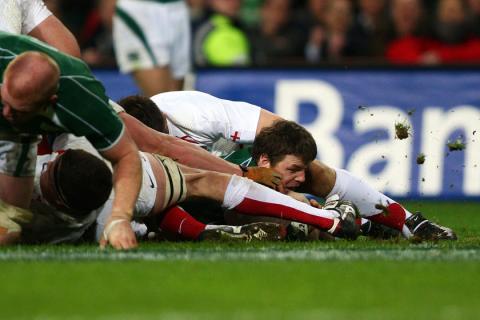Lessons could be learned from our rugby players

A sense of solidarity from government would help recover Ireland's ailing economic team. By Vincent Browne.
Last Friday morning, I caught a snatch of the Pat Kenny programme, on which a panel was discussing the issues of the week.
The question of Alan Dukes’s ministerial and TD pensions arose, leading Kenny to comment to the effect: why would Dukes agree to take on the responsibilities of chairman of Anglo Irish Bank if he was required to relinquish his pensions, thereby earning no additional income from Anglo Irish? Why would he do it for nothing?
(Picture: Brian O'Driscoll scores against England)
It may be that Kenny was making this remark to prompt debate, rather than to express a personal opinion, but certainly that opinion is prevalent in many sections of this society, including perhaps among the rugby fraternity.
I refer to the rugby fraternity because I want to contrast Kenny’s comment with an incident from the second of Munster’s matches in this Heineken Cup campaign, a match against Italian club Treviso in Thomond Park on October 17.
Treviso scored two early tries and were leading 10-0.
For those of us Munster fans, this was not a cause for undue alarm, but it was a little discomforting, because Munster had lost its opening match in the campaign against Northampton.
Shortly after Treviso scored their second try, they threatened to score a third, which would have been even more worrying. There was a kick towards the try line and one of Treviso’s wingers was in speedy pursuit of the ball, with only New Zealand winger Doug Howlett to beat.
But Howlett is one of the best wingers in the world, so I - and presumably half a million other Munster fans - were reassured. Then suddenly, as he was racing back to clear the ball, Howlett tore a hamstring.
He leapt in pain, then limped and it seemed certain Treviso would score a third try. But Howlett composed himself, ran through the pain of the torn hamstring and cleared the ball.
Howlett had just passed his 31st birthday. As he was running through the pain barrier to save a certain third Treviso try, it must have crossed his mind that running on a torn hamstring could do terminal damage to his rugby career, with serious financial consequences.
He could hardly expect to continue to play professional rugby for many years longer, given his age. Yet he was prepared to do it, not because he had anything to gain financially for doing so - quite the opposite - but because of a sense of solidarity with his team.
This fellow is from Auckland, of Tongan descent. He holds the record for the number of tries scored for New Zealand. He had no attachment to Munster of any sort when he joined the team in early 2008, and was a member of the team that won the Heineken Cup in May 2008.
Yet this man, from the other side of the world, was prepared to put his rugby career on the line in support of his new comrades in Limerick, for no personal gain whatsoever, in financial terms at least.
If a Tongan All Black is prepared to put his career on the line for his comrades in Limerick (and even in Cork) why should it be surprising if Dukes sacrificed his pensions for a few years, while he performed another public affairs function, in solidarity with the people of a society of which he has been a part all his life?
Do we not expect a sense of solidarity from ourselves of the kind Howlett showed to Munster, of the kind that Brian O’Driscoll, for instance, regularly shows for Leinster and Ireland? Or any solidarity at all?
A bogus solidarity has been urged on us by Brian Cowen and others on the measures to rectify the crisis that Cowen and these others created. They have presumed to tell us that we are all in this together, while afflicting disproportionately those least able to bear the affliction.
What they really mean is that those paid least in our society should show solidarity, while those paid most continue largely to escape the demands of solidarity.
Arguably, we are in a more precarious position now than we were 18 months ago, because of the demands of the financial markets, which don’t know solidarity.
It may be that, in order to continue to borrow tens of billions annually, we have to show we are undoing the damage to our fiscal arrangements that Cowen and these others mishandled. If this is correct, certainly we need a sense of solidarity in so undoing.
But wouldn’t we want those most able to bear the burdens of readjustment to carry the heaviest loads? Isn’t that what solidarity is about?
Shouldn’t we expect our billionaire tax exiles, for instance - who have benefited so enormously from the social bonds of this society in helping them to become billionaires - to become tax resident again and to bear a large share of the burden?
And the 250 richest, recently identified, who between them have wealth of €40 billion - how about all of them, including the billionaire tax exiles, bearing their fair share, even if they have to take a bit of pain? How about everyone earning more than €100,000 and couples earning more than €160,000, paying 40 per cent of their income in tax? That would do the trick.
The financial markets would be very pleased. No crisis. No problem. Ball cleared. Just solidarity.
Just like Doug Howlett.
